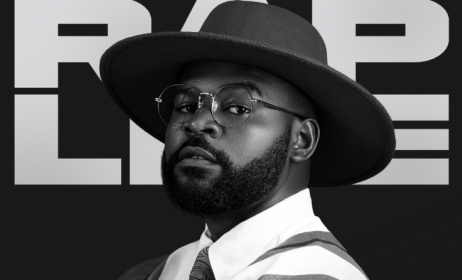Is Falz's activism superficial?
Falz must be confused. What to do, he must wonder, to catch a break?
 The video for the Falz single 'Child of the World' has drawn criticism.
The video for the Falz single 'Child of the World' has drawn criticism.
He’d shed the red nose, purged his shirtfront of the stuffed cloth, washed off the excess powder, broke character. Weren’t these the same folk who hanker after conscious music? Where is the gratitude? Should he just dial back the sense of social responsibility? Was it time to imbibe that Yoruba imperative: "Falana gbo ti e, tara eni la n gbo"?
First, it was 'This is Nigeria'. Perhaps he could understand what furore followed that one. He’d lifted the concept whole, neglected to leave his calling card. In hindsight, perhaps he might have thought through a lyric or two better, spared the things a second thought, had everyone not impressed upon him the need for speed in riding Childish Gambino’s gigantic wave? Perhaps. And how cool is that name?
And now, 'Child of the World'.
Despite protestations by the critic Oris Aigbokhaevbolo, the aspect of an NDA drill sergeant is not required of great rappers. Not while the greatest rapper ever—for sheer skill—was an irreverent clown. That Falz the skitmeister has become Falz the feted rapper takes some doing. That that rapper now frequently breaks character in service of conscience takes some getting used to—compartmentalising personas properly might be one lesson to learn from Eminem.
Despite the dissonance, Falz is rather handy with words. Despite the clowning, Falz is one of very few 'mainstream' Nigerian rappers—Mode 9 and a less corpulent MI immediately spring to mind—who have demonstrated the ability to ride a coherent narrative tight through an entire song.
Just as well then that 'COTW' calls to mind an old Mode 9 triumph. In pursuing a harrowing subject over a contemplative beat, 'COTW' inhabits the same planet as Mode 9’s 'Cry'. Or nearly. Where 'COTW' is a homeless bum, 'Cry', naturally, is the guy alien invaders ask to be taken to.
The title is classic Falz—a clowning, literal translation of the Yoruba phrase "omo aye". Sola, its protagonist, is an academic star, unsullied, unblemished, blameless, the embodiment of the woman Falz’s significant back catalogue of subtle misogynoir and sexist petit-moralisation has been gesturing towards. The one who doesn’t “join bad gang”. The one who won’t ask you for something light.
All that changes with Uncle Peter’s sordid intervention. An Elektral fixation on her aggressor will not suffice, we learn; sex, not fatherly love, is now the object of her attention, a pursuit that soon turns her a profit. Since the wages of sin is infection, she contracts HIV, then attempts suicide on the one Lagos landmark that seems to appear in Nigerian film. She doesn’t go through with it and finds within herself a calling to advocacy.
'COTW' is agitprop. Jolted by infection, Sola, daughter of an absentee father and a very present prayer warrior mother, transcends her circumstance, usurps victimhood, rediscovers a mission thought misplaced following sexual abuse at the insistent hands of a randy uncle. That 'COTW' dwells on Sola’s unfortunate circumstances merely serves as foil for an impending triumph. 'COTW'’s resolution is a vantage point of Christian optimism from which we must look back in gratitude.
In the bleakness of the resolutions of its two verses, perhaps 'Cry' can come across as agitprop. But Mode 9 pays “messages” little mind. And no one tagged slogans at the backend of videos back then.
Mainly, 'Cry' is unchristian in its dedication to futility. It is an imploration to catharsis, to let it all out, in the aftermath of the sundering of two affectionate bonds. Where Sola made her mother pray, 'Cry'’s contenders make their women cry—or bald. No Okonkwos inhabit 'Cry'’s lines; tears and only tears will follow these deaths.
Falz has caught some flak for 'COTW'. Laziness, superficiality, the charges read again, as it was with 'This is Nigeria'. It’s a battered trope, his detractors charge, worn down, reductive, tired, this good-girl-made-bad-comes-good trope. The man, it appears, enjoys a shortcut.
It is true that Falz appears to be mired in superficiality—the catalogue of headlines masquerading as critique in 'This is Nigeria' is ample evidence. (At least we know Mode 9 to be bookish despite the parade of humorous ethno-sexist stereotypes in 'Nigerian Girls'.) It is also true that at 27, Falz is very much an embodiment of his generation, a generation that cultivates a wanton predilection for the facile and a sharp distaste for nuance. Look closely at Falz’s oeuvre and an unhealthy obsession with simple-minded moralisation directed at women is revealed. Understandable then that the easiest route to advocacy is through cliché. Don’t become a victim of your circumstance. Meh.
What were we expecting anyway—a delicate explication of sexual politics? From Falz? Such explication is hardly the domain of agitprop, despite the best efforts of Reminisce’s Ponmile’s video. It is why the cognitive dissonance between that video’s cautionary intent and the song’s ominous admonition is hard to miss.
Yet, we cannot damn Falz completely. His father might be a famously brilliant explicator of the law’s nuances but these things don’t always rub off—and Falana Senior’s sexual politics are not a matter of public record. Here’s an articulate artist grappling newly with the demands of social responsibility. As he grows, there will be missteps, teething problems on the journey toward optimal dentition. With time—one hopes—these simple-minded politics will admit some complexity. The butterfly may yet escape the chrysalis.




























Comments
Log in or register to post comments